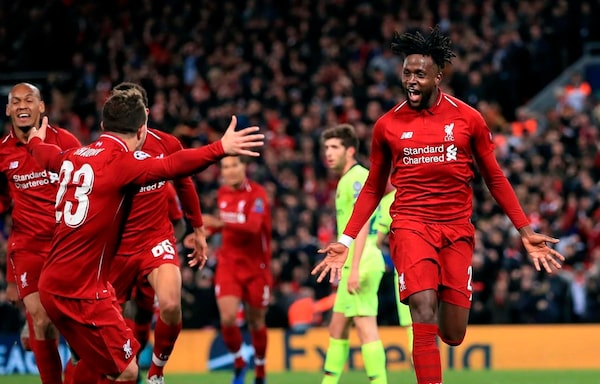
Liverpool's Divock Origi celebrates scoring his side's fourth goal against Barcelona at Anfield.The Canadian Press
The idea of the European Cup, when it was created in 1955, was to bring together soccer champions from across the continent to decide which country truly had the best team.
Was Real Madrid better than AC Milan? Could Manchester United beat Benfica? Could Ajax beat Juventus? Round after round, year after year, fans finally were able to see top teams battle it out in competitive games with a major trophy on the line.
Now called the Champions League, this year’s final will once again determine the top club team in Europe. Will it be Liverpool, from England’s Premier League, or Tottenham Hotspur, from, er, England’s Premier League?
The game will take place in Madrid on June 1, but given the participants it might as well be a routine November league match in London. Neither team is the reigning English champion, either: Spurs finished third last season, Liverpool fourth.
For decades, such a matchup was impossible; countries were permitted to send only one team to the European Cup, with an exception made only for the defending champion. But in 1997-98, some league runners-up were admitted, too, and before long, three, four and sometimes five teams from the biggest countries were allowed to enter. Suddenly it was possible – likely even – for a team to be champion of Europe without being the champion of its domestic league.
Expansion also increased the likelihood that the Champions League final would be contested by two teams from the same country, and it duly happened in 2000 (Real Madrid vs. Valencia) and five times since then. Three years later, Italy’s Juventus met AC Milan. In 2008, England also had both finalists, and Manchester United beat Chelsea on penalties. More recently, a single-country final has become something of a Champions League feature: Bayern played Dortmund in an all-German final in 2013 and, in 2014 and 2016, the finalists came from the same city: Real Madrid and Atletico Madrid.
Some factions in Europe do not seem to mind this: A group of top clubs, led by Juventus and its president, Andrea Agnelli, is pushing to reshape the Champions League even further, to ensure that the biggest teams always have a place, that the smaller ones get pushed to the margins even more, and the Union of European Football Associations (UEFA) this week signalled it might be willing to go along.
One of this year’s semi-finalists, Ajax Amsterdam, a pedigreed team from a respected league, was considered a plucky underdog in the Champions League; in a competition increasingly dominated by rich clubs from big leagues, Ajax, by comparison, was neither very rich nor its league very big. While 26 teams, including four from England, got to go right into the group stage, Ajax had to get through three qualifying rounds to make it that far. Teams from the very smallest countries would have to get through a full five rounds.
After the first legs of this season’s semi-finals, won by Ajax, 1-0, and Barcelona, 3-0, there was hope, at last, for an underdog in the final, even if it looked set to face a Spanish giant.
But then Liverpool and Spurs completed stunning comebacks in the second legs, and a final that seemed destined to be about history and style and storied teams – Barcelona has won five Champions League titles and Ajax four – lost some of its magic.
Soon, this season’s dominance of the Premier League could extend even to UEFA’s second-tier championship, the Europa League, where Arsenal and Chelsea are on the cusp of advancing to the final. It would be the first time two English teams have met in that final since the first season, in 1971-72.
The successful year in European play for England harks back to the late 1970s and early 1980s, when English teams won six European Cups in a row. Despite triumphs by Manchester United, Chelsea and Liverpool since 2005, English teams have been known more recently for losing Champions League finals (six defeats since 2006) than winning them.
This year, England is guaranteed the trophy, and one of the two finalists sometimes faulted for a lack of trophies at home – Liverpool’s most recent English league title was in 1990; Spurs have not won the league since 1961 – will be crowned champion of Europe.